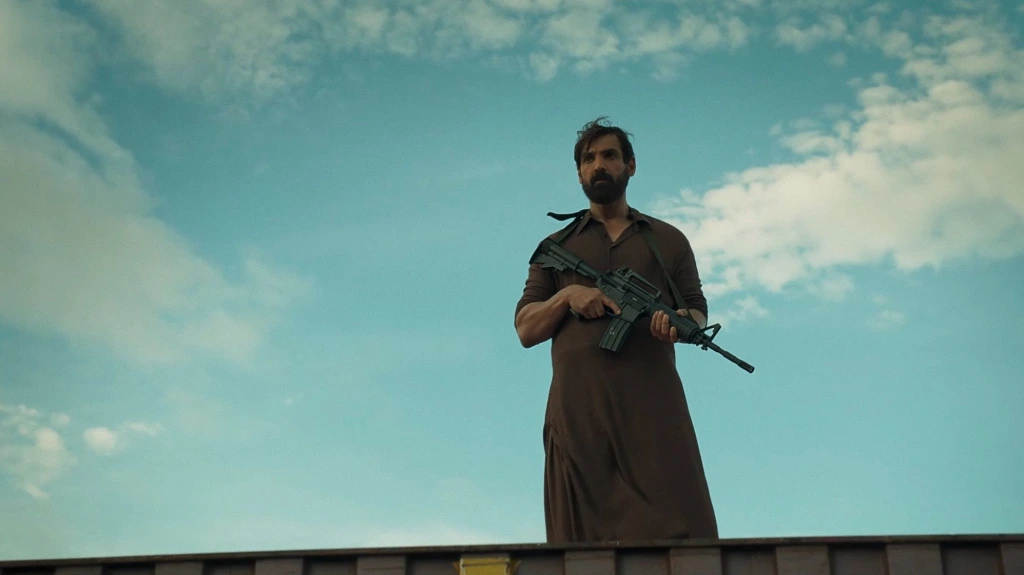Arun Gopalan’s Tehran (2025) isn’t a chest-thumping spectacle of espionage. Instead, it strips away the gloss and glamour of the spy genre to reveal something raw, wounded, and profoundly human. At its core is Rajiv Kumar (John Abraham), an officer in Delhi’s Special Cell caught in the crossfire between orders, politics, and his own unyielding code of honor. Where most action films revel in the protagonist’s strength, Tehran poses a harder question: what does it mean for a man to pursue justice when the very nation he serves turns its back on him?
Spoilers Ahead
Tehran (2025) Plot Summary & Movie Synopsis:
Who is Rajiv Kumar, Really?
Rajiv Kumar enters Tehran, who is already infamous in intelligence circles. Known for being rebellious, impulsive, and unwilling to bow to authority, he is as much a liability as he is an asset. His boss, Neeraj, and the R&AW chief are aware of this, but his strict moral compass makes him uniquely effective. Rajiv doesn’t work for power or politics – he works for justice, even when it costs him everything.
When a bomb blast in Delhi kills Israeli diplomats and an innocent flower-selling girl, Rajiv is reluctantly assigned to the case. Initially detached, his perspective changes when he sees the child die in a hospital bed, leaving behind a younger brother staring helplessly at her body. This image becomes Rajiv’s anchor. Unlike politicians chasing leverage, he cannot accept innocent Indians being collateral damage in someone else’s war.
Why Does Rajiv Go Rogue?
As Rajiv investigates, he uncovers the web of retaliatory violence between Israel and Iran. Iranian operatives Shaheen Sultani, Reza Abassi, and Afsar Hosseini emerge as the masterminds behind attacks across Asia and Europe. Determined to send a message that India will not be a playground for foreign vendettas, Rajiv launches a covert mission to eliminate them. But politics turns against him. India needs oil from Iran, and the Iranian delegation threatens to cut ties if Rajiv’s mission continues.
The diplomats want to spin the attacks on Pakistan instead, to further their own agendas. Even Israel, initially eager, withdraws support to avoid escalation. In Tehran, Rajiv becomes a ghost – abandoned by his allies, hunted by Iranian forces, and with a bounty on his head. Still, he refuses to abandon the mission. For Rajiv, it isn’t about diplomacy or national gain. It’s about the child on the Delhi street corner who should never have died.
What Role Does Tamir Play in Rajiv’s Journey?
When Rajiv reaches Tehran, he finds an unlikely ally in Tamir (Adam Karst), a man scarred by his own tragedy: the death of his son in a bomb blast. Their bond grows during the seven days they spend in hiding, when Tamir shares the weight of regret that still haunts him – never hugging his son one last time, never saying he loved him. Rajiv sees in Tamir the very pain he has been running from: the unbearable knowledge of failing to protect the innocent.
It is this bond that transforms Rajiv’s mission from professional duty into something far more personal. Tamir insists on helping him, despite Rajiv’s protests, and dies during their operation against Afsar’s network. His death embodies the cost of vengeance – justice may be achieved, but it always demands a personal sacrifice.
Why Does Rajiv Hand the Gun to Syed Ali Instead of Killing Afsar Himself?

The climax unfolds in a Tehran safehouse. Rajiv captures Syed Ali, Afsar’s loyal lieutenant, only to discover that Afsar had secretly betrayed him, planting a tracker that led his own men to the hideout. When Rajiv finally corners Afsar, the tables have already turned: the Iranian regime itself wants Afsar gone, eager to scapegoat him for killings that jeopardized their standing. In that moment, Rajiv makes a startling choice – he does not kill Afsar. Instead, he hands the gun to Syed, the man Afsar betrayed.
Because for Rajiv, justice has to mean more than revenge. If he kills Afsar, it becomes another state-sanctioned execution, buried under politics. But by letting Syed deliver the final blow, Rajiv transforms the act into poetic justice: Afsar is destroyed not by his enemy, but by the brother-in-arms he deceived. It is a betrayal answered by betrayal, vengeance returned in its purest form.
On a psychological level, Rajiv refuses to let vengeance define him. Killing Afsar would have satisfied his rage. However, it would also trap him in the same cycle that consumed Tamir. By allowing Syed to pull the trigger, Rajiv acknowledges that vengeance belongs to those most wronged – and that his fight has always been about protecting his nation, not indulging his grief.
Tehran (2025) Movie Ending Explained:
Why Does Rajiv Let Syed Kill Afsar Hosseini?
At first glance, Rajiv’s decision to let Syed kill Afsar might look like weakness. But it is, in fact, the most deliberate choice he makes in the film. Throughout “Tehran,” Rajiv is caught between two worlds: the ruthless pragmatism of governments and his own uncompromising moral code. Killing Afsar himself would have reduced his mission to a personal vendetta. By letting Syed deliver the final shot, Rajiv ensures the act is both just and symbolic – Afsar dies at the hands of the man he betrayed, not the state he defied.
This decision also shields Rajiv from the psychological trap that consumed Tamir. Where Tamir’s life was shattered by grief and the inability to let go, Rajiv refuses to let vengeance become his identity. He acknowledges the pain but resists letting it define him. Ultimately, “Tehran” is less about espionage and more about upholding integrity in a world of shifting loyalties. Rajiv walks away not as a victor, but as a man who chose principle over power. His silence at the end is not emptiness – it is the quiet certainty that justice, however fragile, was served on his terms.
What Does the Ending of Tehran Mean?
Rajiv survives, barely, and returns home with the mission technically accomplished. Yet the film does not present this as triumph. India loses its gas deal with Iran, Israel gains nothing, and the cycle of geopolitical manipulation continues. But for Rajiv, the meaning lies elsewhere: since 2012, no attack has occurred on Indian soil.
His stand, reckless as it seemed, sets a precedent that Indian lives will not be reduced to bargaining chips. The final exchange between Rajiv and Neeraj carries a masculine undertone, as two men navigate the space between duty and personal conviction. Neeraj speaks for the state, always willing to bend the truth for advantage. Rajiv speaks about the human cost, willing to sacrifice alliances if it means protecting ordinary citizens. Within that tension, “Tehran” finds its soul.






